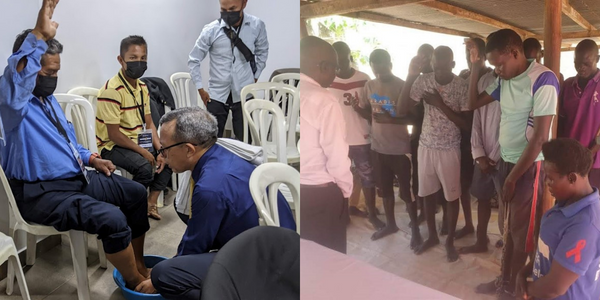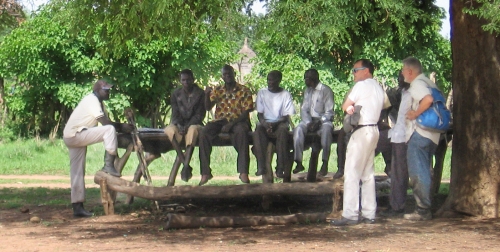
Photos by the Office of Global Mission
By Eric Miller, director of Global Missions for the Church of the Brethren
“Look at the nations and see! Be astonished! Be astounded! For a work is being done in your days that you would not believe if you were told.”
– Habakkuk 1:5
What comes to mind when you think about Church of the Brethren missions and missionaries? What sort of work have we done together? Do you know how we have an impact around the world?
Reading documents in the archives, it is easy to see the tension between evangelism and service in Brethren missions of the past, but the two goals were never really at odds. Brethren missionaries went to serve God and to care for people, not to earn their way into heaven or score points with God. They preached the Gospel and lived it. Frank Crumpacker walked from village to village preaching. Howard Sollenberger collected supplies and medicine for people suffering from poverty and war. They built churches, hospitals, schools, and even a major road. Seventy years after the last missionary left, people still remember. Loving God and neighbor matters. Making disciples takes time. We baptize people into a church to join with us as members of the body of Christ. We may fall short, but we are not doing it just for show. We may not always see the results of our work, but we know if we are faithful God will bring a good harvest.
Working in Global Missions, I hear variations on this theme: we know Jesus cares because you care. You gave us a cup of water when we were thirsty. You stayed with us. Our global Church of the Brethren family is strongly evangelical. They love to share the gospel and plant churches. They also reach out to the downtrodden in their own communities. In Rwanda they worship side-by-side with the often-overlooked Btwa people and partner with them in farming. In Venezuela, they take boats up the river into the jungle to worship with indigenous sisters and brothers. In the Dominican Republic, the neighborhood churches reach out to the sick, elderly, and poor who live nearby. In South Sudan, after our country director Athanasus Ungang was wrongly imprisoned, he started a prison ministry that continues after his release and exoneration.
To be clear, we have not been perfect. We are a small church that offers Jesus, what we have, and our friendship. I have seen what impact our small church has made through our faithfulness, in communities that remember our love decades later. We may sometimes feel pressure to do more, to close a deal of faith today, but ultimately we aim to build churches on strong foundations that will endure and glorify God. May we continue to share the love of Jesus with all people and be willing to accept the gifts they share in return.
Did you know the Church of the Brethren has partnerships and programs in all of the following countries?
Brazil, Burundi, China, Democratic Republic of Congo, Dominican Republic, Ecuador, Haiti, Honduras, India, Mexico, Nigeria, Rwanda, South Sudan, Spain, Uganda, Venezuela, Vietnam
Learn more about the work of Global Mission at www.brethren.org/global or support this ministry today at www.brethren.org/givegm.


